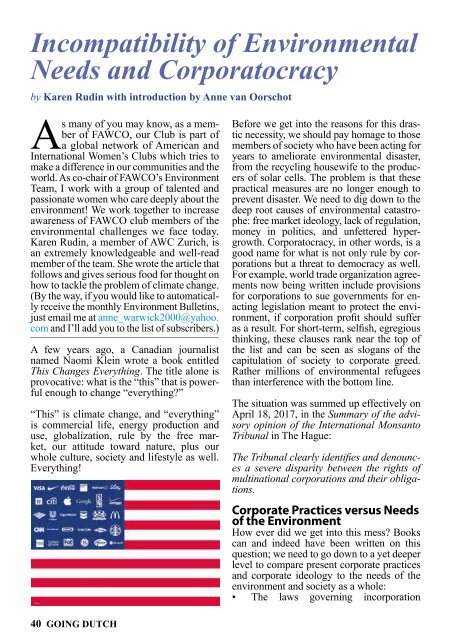April2018Final
American Women's Club of The Hague Magazine April 2018
American Women's Club of The Hague Magazine April 2018
You also want an ePaper? Increase the reach of your titles
YUMPU automatically turns print PDFs into web optimized ePapers that Google loves.
Incompatibility of Environmental<br />
Needs and Corporatocracy<br />
by Karen Rudin with introduction by Anne van Oorschot<br />
As many of you may know, as a member<br />
of FAWCO, our Club is part of<br />
a global network of American and<br />
International Women’s Clubs which tries to<br />
make a difference in our communities and the<br />
world. As co-chair of FAWCO’s Environment<br />
Team, I work with a group of talented and<br />
passionate women who care deeply about the<br />
environment! We work together to increase<br />
awareness of FAWCO club members of the<br />
environmental challenges we face today.<br />
Karen Rudin, a member of AWC Zurich, is<br />
an extremely knowledgeable and well-read<br />
member of the team. She wrote the article that<br />
follows and gives serious food for thought on<br />
how to tackle the problem of climate change.<br />
(By the way, if you would like to automatically<br />
receive the monthly Environment Bulletins,<br />
just email me at anne_warwick2000@yahoo.<br />
com and I’ll add you to the list of subscribers.)<br />
A few years ago, a Canadian journalist<br />
named Naomi Klein wrote a book entitled<br />
This Changes Everything. The title alone is<br />
provocative: what is the “this” that is powerful<br />
enough to change “everything?”<br />
“This” is climate change, and “everything”<br />
is commercial life, energy production and<br />
use, globalization, rule by the free market,<br />
our attitude toward nature, plus our<br />
whole culture, society and lifestyle as well.<br />
Everything!<br />
40 GOING DUTCH<br />
Before we get into the reasons for this drastic<br />
necessity, we should pay homage to those<br />
members of society who have been acting for<br />
years to ameliorate environmental disaster,<br />
from the recycling housewife to the producers<br />
of solar cells. The problem is that these<br />
practical measures are no longer enough to<br />
prevent disaster. We need to dig down to the<br />
deep root causes of environmental catastrophe:<br />
free market ideology, lack of regulation,<br />
money in politics, and unfettered hypergrowth.<br />
Corporatocracy, in other words, is a<br />
good name for what is not only rule by corporations<br />
but a threat to democracy as well.<br />
For example, world trade organization agreements<br />
now being written include provisions<br />
for corporations to sue governments for enacting<br />
legislation meant to protect the environment,<br />
if corporation profit should suffer<br />
as a result. For short-term, selfish, egregious<br />
thinking, these clauses rank near the top of<br />
the list and can be seen as slogans of the<br />
capitulation of society to corporate greed.<br />
Rather millions of environmental refugees<br />
than interference with the bottom line.<br />
The situation was summed up effectively on<br />
April 18, 2017, in the Summary of the advisory<br />
opinion of the International Monsanto<br />
Tribunal in The Hague:<br />
The Tribunal clearly identifies and denounces<br />
a severe disparity between the rights of<br />
multinational corporations and their obligations.<br />
Corporate Practices versus Needs<br />
of the Environment<br />
How ever did we get into this mess? Books<br />
can and indeed have been written on this<br />
question; we need to go down to a yet deeper<br />
level to compare present corporate practices<br />
and corporate ideology to the needs of the<br />
environment and society as a whole:<br />
• The laws governing incorporation<br />
require increase in shareholder value<br />
and steady growth and expansion, while<br />
the environment needs contraction of<br />
our profligate use of resources.<br />
• The corporate world lives by competition;<br />
the human community needs cooperation.<br />
• Agreements meant to protect corporations<br />
are legally binding; agreements<br />
meant to protect the environment are<br />
unenforceable, weak, and tenuous.<br />
• Extractivism as practiced by the fossil<br />
fuel companies sees nature as currency;<br />
the laws of nature are such that<br />
it must be seen as capital.<br />
• For hundreds of years we have seen<br />
man as master over nature; now we<br />
must acknowledge that man has to be a<br />
responsible partner of nature.<br />
• Global concerns interpret freedom as a<br />
lack of regulation, so that freedom becomes<br />
rapaciousness; man’s freedom in<br />
nature requires responsible, cooperative<br />
behavior.<br />
• A small minority, thinking in terms of<br />
short-term earnings, rules the economy,<br />
political process and media; nature and<br />
society need long-term solutions.<br />
• Our prevailing philosophy in well-off<br />
countries is rampant consumerism; we<br />
need to make the change to a philosophy<br />
of “enoughness.”<br />
Possible Solutions<br />
Considering solutions to our environmental<br />
and societal ills, we see immediately that<br />
corporations cannot be in control of these<br />
solutions. Beyond needing “green” government<br />
policy with clout, we need control in<br />
the hands of communities:<br />
• Make low-carbon choices affordable<br />
for everyone, which would involve both<br />
government policy and community<br />
control.<br />
• Change the tax structure radically. The<br />
wealthiest should be taxed more heavily,<br />
for instance.<br />
• Consider a basic annual income for everyone.<br />
Technology is taking over more<br />
and more jobs as it is; wasteful jobs<br />
could be dumped.<br />
• Enact policies that combine climate<br />
change action with social action: clean<br />
water, healthy food, etc.<br />
• Stop subsidizing fossil-fuel companies.<br />
The most successful companies in all<br />
time are rolling in money; their subsidies<br />
should go to renewables.<br />
• Stop thinking of “externalities” as external!<br />
Companies should be made to<br />
pay for the pollution they cause.<br />
• Utilities should be in the hands of the<br />
community, which has its own interests<br />
at heart, not those of a company’s<br />
stockholders or a small elite group.<br />
Profits would be returned to the community<br />
and jobs would remain as well.<br />
Community cooperatives are also more<br />
responsive to their members than are<br />
corporations.<br />
• Think cyclically! Upcycle and recycle<br />
so that there is almost no waste. Nature<br />
operates this way; it has no trash cans.<br />
Think, for instance, of a garbage can as<br />
a “nutrient rest stop.”<br />
• Enact legislation encouraging regenerative<br />
farming: agroecology.<br />
• Oppose globalization, which puts enormous<br />
power in the hands of international<br />
companies, pollutes heavily by<br />
long-distance transport and subjugates<br />
the developing world to outside control.<br />
• Realize that the most important conservation<br />
today is keeping carbon in the<br />
ground. The fossil-fuel age is finished.<br />
After all, the stone age did not end because<br />
we ran out of stones. Compensate<br />
governments that conserve this way;<br />
the whole world benefits.<br />
• Radically change political systems<br />
that operate on huge contributions<br />
from corporations in exchange for >> 42<br />
APRIL 2018 41

















